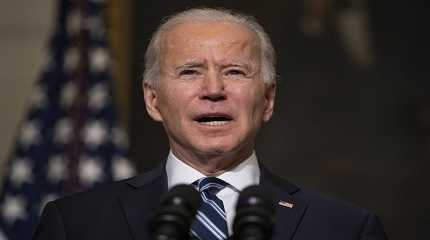
WASHINGTON (AP) — President Joe Biden said Wednesday his administration’s goal of ending hunger in the U.S. by the end of the decade was ambitious but doable, if only the nation would work together toward achieving it.
“I know we can do this,” Biden told an auditorium full of public health officials, private companies and Americans who have experienced hunger. They were gathered for the first White House conference on hunger, nutrition and health since 1969.
It was the president at his most optimistic, sketching out a future where no child in the U.S. would go hungry, and diet-related diseases would diminish because of better, healthier food alternatives and access to vast outdoor spaces.
“That’s why we’re here today, to harness our greatest resource: Our fellow Americans,” Biden said. “Everyone, everyone has an important role to play.”
The 1969 conference, hosted President Richard Nixon, was a pivotal moment that influenced the U.S. food policy agenda for 50 years. It led to a major expansion of the Supplemental Nutrition Assistance Program, commonly known as food stamps, and gave rise to the Women, Infants and Children program, which serves half the babies born in the U.S. by providing their mothers with parenting advice, breastfeeding support and food assistance.
And yet, 10% of U.S. households in 2021 suffered food insecurity, meaning they were uncertain they could get enough food to feed themselves or their families because they lacked money or resources for food, according to the Food and Drug Administration.
Scientific advances have helped Americans better understand how the foods they eat contribute to disease. One of the administration’s goals is to decrease obesity and diet-related disease like diabetes and hypertension through better promotion of healthy eating, good nutrition and physical activity.
Some of the conference attendees have known hunger. Jimmieka Mills, co-founder of Equitable Spaces, a nonprofit that connects those working on hunger solutions with people who have experienced hunger, said it was “an historic opportunity for us to learn directly from those impacted.”
She spoke of growing up and experiencing first-hand the impact of poverty, hunger and homelessness.
“I know what it’s like to not know where your next meal will come from,” she said, adding she wanted solutions so that no one in the “country with the most abundant food system in the world ever goes hungry again.”
Before the kickoff, the administration released a list of more than $8 billion in commitments to the cause from private companies, charitable foundations and industry groups. They range from outright donations to in-kind contributions of services and include:
—A $20 million commitment from the Novo Nordisk pharmaceutical company to improve access to healthy foods and safe spaces for physical activity in marginalized communities.
—A $3.85 million commitment from the Publix grocery store chain to supply food to local food banks and establish free mobile food pantries.
—$22 million from the Danone food company to fund a program to help “at least 300 million Americans to build healthier dietary habits.”
—A commitment from the Meijer grocery store chain to offer up to a 10% discount to incentivize users of the SNAP program to buy fruits and vegetables.
While Biden is touting the successful buy-in campaign from the private sector, some of the strongest potential obstacles to his proposals lie in the increasingly partisan Congress.
Proposed policy changes include an expansion of SNAP eligibility, expanding access to free meals in schools and extending summer meal benefits to more schoolchildren. All of those changes would require congressional approval.
The president called on Congress, too, to revive and make permanent the expanded child tax credit that has expired. The number of children in America living in poverty jumped dramatically after just one month without the expanded child tax credit payment.
“Meeting our bold goals requires a whole of government approach ... And a whole of society effort,” he said.




